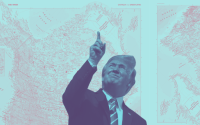Published on Tuesday, March 2, 2004 by the Seattle Post-IntelligencerHelen Thomas
With friends like Ahmad Chalabi, the United States doesn't need enemies.
Chalabi is the Iraqi exile who now brags that his years of lobbying and coaxing American officialdom into war against Iraq have paid off.
He achieved his goal of dethroning Saddam Hussein by feeding the Bush administration his smarmy "intelligence" that Iraq had weapons of mass destruction. His neo-conservative friends here, mostly in the Pentagon, eagerly lapped up his blathering because they were looking for an excuse to attack Iraq. Chalabi, who can claim parenthood of the U.S.-led invasion, headed the Iraqi National Congress, which was formed in exile and nurtured with U.S. financial aid.
Last week, he gave an interview to London's Daily Telegraph that added to the embarrassment of the Bush administration. The fact that no weapons of mass destruction have been uncovered, he declared, is of no importance.
Come to think about it, that's just what the administration is saying while keeping up the pretext that it is still scouring Iraq for those doomsday weapons. That is the same arsenal that just a year ago posed such a danger to the United States that President Bush said he was required to order an attack.
"As far as we're concerned, we've been entirely successful," Chalabi told the newspaper. "That tyrant Saddam is gone and the Americans are in Baghdad. What was said before is not important. The Bush administration is looking for a scapegoat. We're ready to fall on our swords if he wants."
The Telegraph reported that Chalabi dismissed accusations that he deliberately misled the administration.
"We are heroes in error," he claimed.
Appalled at Chalabi's arrogant comments, Rep. Dennis Kucinich, D-Ohio, a presidential aspirant and consistent foe of the Iraqi invasion, issued a statement. "At every step along the way, we have been lied to and misled," Kucinich said. "We were lied to about the reasons for going to war, the cost, the length of our occupation and the real long-term agenda of the Bush administration. Every American citizen should be outraged."
Kucinich added "there's been enough deception and more than enough bloodshed but there continues to be no end in sight."
Chalabi's influence in Washington stems from his close friends in government, folks like Vice President Cheney, Deputy Defense Secretary Paul Wolfowitz and Richard Perle, former chairman of the Defense Policy Board.
Those contacts not only helped him achieve his goal of provoking a U.S. attack but now serve to make him a big man on campus after Baghdad was conquered.
He disclaims leadership ambitions in Iraq, a modesty unbecoming him amid speculation that he aims to be the first president of the U.S.-created new Iraq.
Chalabi hailed from an aristocratic Iraqi family, which fled when the Baath Party deposed the monarchy and established dictatorial rule in 1958.
He cannot travel to neighboring Jordan where he is a wanted man after being convicted in 1992 of embezzlement and fraud in connection with the Petra Bank, which he once headed. He claims the charges were "political."
Chalabi later became a high-rolling silk-suited figure on the London scene.
Although a favorite at the Pentagon, he does not have the same standing at the State Department or the CIA. Those agencies first questioned and then rejected the information that Chalabi eagerly provided in his campaign to spur U.S. military action.
He makes no bones that he tried for more than a decade -- and succeeded -- to get the United States involved in his fight.
Chalabi is a Shiite and a member of the U.S.-created Iraq Governing Council that will be handed political authority on June 30 when L. Paul Bremer, the American administrator, turns over the reins of government to the council.
American troops will not be pulled out at that time; Bremer has indicated that they could stay as long as another year. Others are predicting many more years of military occupation. A White House spokesman said U.S. forces will leave "when the job is done," whatever that means.
Meanwhile, plans for an Iraqi election sputter along toward an as-yet-unknown structure or timetable. But given his deep entrenchment with his Pentagon sponsors, Chalabi is my best bet to emerge at the top of the heap. After all, what are friends for?






